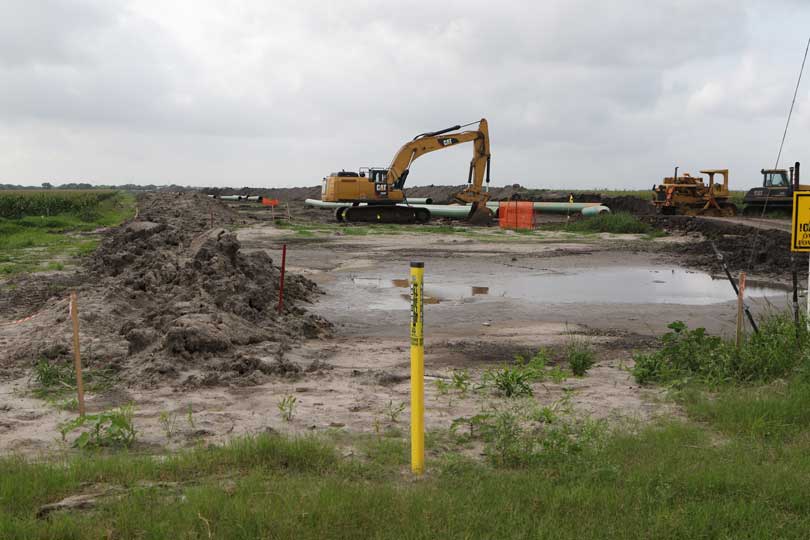By Julie Tomascik
Editor
Months of negotiations between Texas landowner groups and oil and gas industry representatives to address the eminent domain process in the Lone Star State resulted in no new legislation during the 86th Texas Legislature.
SB 421, a bill to reform the state’s eminent domain process, failed to make it to Governor Greg Abbott’s desk in the final hours of the legislative session.
The bill, authored by Sen. Lois Kolkhorst (R-Brenham), aimed to provide more protections for property owners when private companies condemn their land.
In a state with a growing appetite for new development, taking by eminent domain has become a common practice. Transmission lines and pipelines owned by private companies crisscross Texas land, leaving landowners, who are often uniformed, to try to figure out the puzzle of negotiations and easement terms.
“It is extremely disappointing and disheartening to see good legislation left behind once again,” Texas Farm Bureau (TFB) President Russell Boening said. “We negotiated in good faith with industry representatives from oil and gas, pipeline and electric companies to no avail. I was involved in much of the negotiations, and I am proud of our efforts.”
The legislation would have provided meaningful reform for rural, urban and suburban Texas. It outlined measures to prevent low initial offers, improve easement terms and require meetings to ensure property owners better understand the condemnation process.
But the bill, which the Senate passed with a bipartisan vote of 28-3, was significantly weakened in the House Committee on Land & Resource Management.
While in committee, the bill that was originally sponsored by Rep. DeWayne Burns (R-Cleburne) was taken over by committee chair Rep. Tom Craddick (R-Midland).
“When the House Land & Resource Management Committee took up the bill, Chairman Tom Craddick said the bill would not leave the committee in its Senate-passed form,” Boening said. “He eventually took over the bill and stripped it down to a shell of what it was, even after months of negotiation and significant compromises. In some ways, it was a step back from the already limited requirements of basic fairness.”
A committee substitute of SB 421 eventually passed the House, but TFB remained neutral on the bill at that point due to changes in the language.
Boening noted the goal was to work on further compromise in the conference committee and continue building on months of negotiations.
“In the conference committee, we expected the oil, gas and utilities industry groups to honor their commitments that were the result of months of compromise on SB 421,” Boening said. “Clearly, they did not. The industry groups chose to abandon their agreement. They refused to accept a conference committee report that included language on bona fide offers, easement terms and property owner meetings they requested in negotiations.”
The version of SB 421, as it sat in conference committee, simply did not offer landowners the protections, fairness or transparency that was needed, Kolkhorst said.
“While I have respect for Chairman Craddick and have worked with him for many years, my interests lie in contrast to his,” Kolkhorst said. “My interests lie with fair treatment of property owners across the state. Texans believe in the right to ‘life, liberty and property,’ which is granted to us in the United States Bill of Rights, and that’s why we must demand serious protections for landowners against takings of private property by private entities.”
As the state continues to grow, Texans will be faced with more takings. Will they be treated fairly? Will the condemning entities be transparent?
Some may. Some may not. But now there will be no legislation to hold the private entities accountable.
“Clearly, the industry groups refused to honor the commitments they made to Sen. Kolkhorst and Rep. Burns in the negotiations,” Boening said. “With the rejection of the compromise, they have shown they aren’t interested in addressing the abuse of eminent domain in Texas.”
But Texans are interested and invested.
TFB members made multiple visits to talk with lawmakers about the need for eminent domain reform. Throughout the session, 129 Farm Bureau leaders from 83 counties made Capitol visits, in addition to the CFB Le


Time to get rid of Craddick!
Special thanks to Senator Kolkhorst and all the other people that lead the fight. The momentum was there and will not be forgotten. As with everything worth fighting for you may fail but must try and try again. Thank you for your support of the Texas land owners ..many being the pioneers of Texas making it a great place to live. Let’s continue the good fight for the rights of the land owners and appreciate the heritage and history they represent.